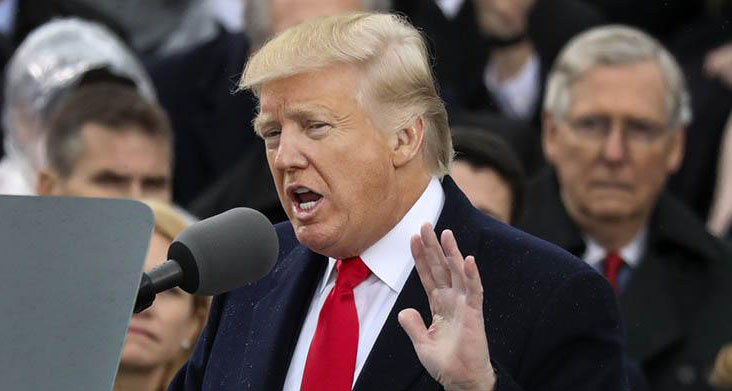
President Donald Trump speaks after being sworn in as the 45th president of the United States during the 58th Presidential Inauguration at the U.S. Capitol in Washington, Friday, Jan. 20, 2017. Photo: Andrew Harnik, AP
To coincide with his first week in office, Research Amer!ca has published the results of a survey examining Americans’ opinions about science, health and innovation under President Donald Trump.
According to the survey, Americans are split as to whether the United States will be seen as a global leader in science and innovation under Trump—41 percent agree, 40 percent disagree and 19 percent are not sure. For this particular question, it’s important to note opinions were given heavily in favor of party lines. A majority of those in agreement are registered republicans (70 percent) compared with independents (34 percent) and democrats (19 percent).
Party lines are also held when participants were asked if great strides in science and innovation will continue under the Trump administration—46 percent agree, 33 percent disagree and 22 percent are not sure, with more republicans (74 percent) agreeing than independents (44 percent) and democrats (22 percent).
Surprisingly, party lines were not held in a question about taxes, despite Trump’s calls for cuts in federal spending and the very different ideologies of each party when it comes to taxes, specifically.
Overall, 52 percent of Americans said they would be willing to pay $1 per week more in taxes if they were certain all of the money would be spent on additional medical research, including 60 percent democrats, 47 percent republicans, and 47 percent independents. Of the 29 percent that responded no, 36 percent are republicans, 22 percent democrats and 32 percent independents.
Other survey results include:
- 70 percent of survey respondents think the federal government should assign a higher priority to improving STEM education
- 73 percent say it is important to conduct research to eliminate health disparities
- 55 percent favor federal funding for medical research using embryonic stem cells
- 61 percent say it is important for Congress to provide tax incentive to the private sector to develop new medicines and medical technology
- and only 36 percent of respondents think the health care services they personally receive are based on the best and most recent research.
Survey respondents were asked multiple questions about scientific research and its intersection with public policy. A large majority—67 percent of people—agree that public policies should be based on the best available science. Meanwhile, 18 percent are not sure, and only 15 percent said they disagree.
In addition, a majority of Americans agree that scientists should play a major role in shaping policy over a wide range of applications, including—at the highest percentage—medical and health research (83 percent), drug safety and efficacy (81 percent), air and water quality (81 percent), food safety (78 percent), environment (75 percent) and energy (76 percent).
Based on Trump’s previous comments and executive orders thus far, it is somewhat surprising that the majority of Americans support a heavy role of science in public policy, especially concerning the environment. In addition to saying he does not believe in climate change, Trump has made it clear climate change will not be a priority in his administration, already making moves to reverse the climate-friendly policies of his predecessor. However, a 2015 survey from the Pew Research Center and the American Association for the Advancement of Science (AAAS) showed 87 percent of AAAS believed climate change is real, and is caused mostly by human activity. Thus, if Americans want science to influence public policy, climate-friendly laws would be one of the first steps.
It’s no secret that scientists have been openly critical of Trump since he was elected in November. In December, more than 2,300 scientists from all 50 states signed and released an open letter to Congress and Trump urging integrity, transparency and independence during his administration, citing specific concerns about environmental laws and diversity issues.
Last weekend, news broke that organizers were planning a Scientists’ March on Washington intended to be a non-partisan protest that addresses issues such as government funding for scientists, transparency, climate change and evolution. While a date has not yet been set, a website and email address have been created, with the march gaining more and more momentum as the days go on.




